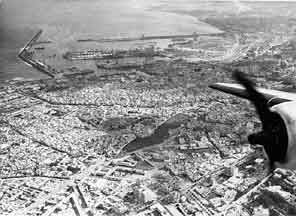Crisis of Tangier.


Moorish café in Tangier in the nineteenth century (Marià Fortuny, 1868)
In 1904, an agreement between the partners of the Entente Cordiale, France and the United Kingdom, leaves France Morocco as a zone of influence, the United Kingdom focusing on Egypt, northern Morocco is granted to Spain. Through this agreement, France has freedom to act in Morocco in exchange, she grants Britain the right to establish its authority over Egypt when France retained strong economic and financial position, including Chairman of the Suez Canal Company. A similar agreement was signed with Italy in 1902, which granted total freedom of action to the Italians in Libya in exchange for their disinterest in Morocco. Emperor Wilhelm II and Chancellor Bülow protest against France's ambitions in Morocco. According to the new doctrine Weltpolitik, Germany wants its share of colonial conquests.
March 31, 1905, in order to prevent the domination of France over Morocco, Wilhelm II arrives theatrically in Tangier, through the town on horseback, at the head of an imposing procession goes to meet the Sultan Abd al-Aziz to ensure support and inform him of his disagreement with the rights granted to France in Morocco. He is ready to go to war if France does not give up his ambitions in Morocco. Sultan Abd el-Aziz impressed by this speech decides to refuse all reforms advocated by Ambassador Eugène Regnault.
France's reluctance, but feeling no ready for war, accepts the request for reconciliation of Germany. This "coup de Tanger" causes a surge germanophobie in France and the resignation of the French Minister of Foreign Affairs, Theophile Delcasse.
No hay comentarios:
Publicar un comentario